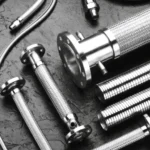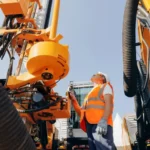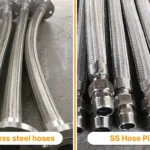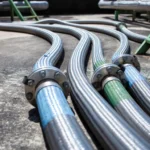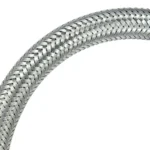Flexible Metal Hoses Applications
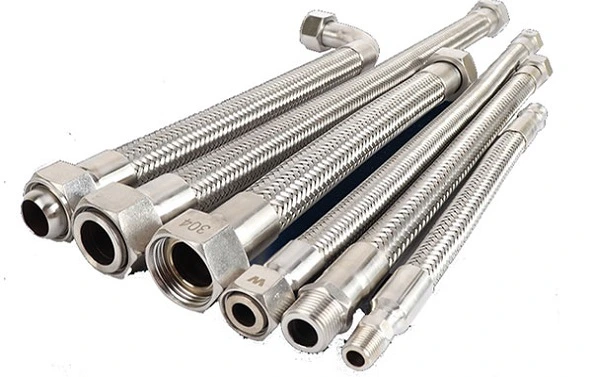
At Quality Flex, we are known to provide high-quality flexible metal hose solutions designed for a wide range of industrial applications. As specialists in manufacturing flexible metal hoses, we offer products known for their exceptional flexibility, resistance to heat and pressure, and ability to resist corrosion. We offer Corrugated Metal Hoses, known for their flexibility and pressure resistance, or Braided Flexible Metal Hoses, which provide enhanced strength and durability. Our metal hoses, made from premium materials such as AISI 316L and AISI 304 stainless steel, meet the highest international standards.
In this blog we will discuss flexible metal hose definition, their key benefits, and industrial applications. Whether it’s managing thermal expansion, absorbing vibrations, or transferring fluids and gases safely, flexible metal hoses deliver reliable performance across a wide array of applications.
Overview of Flexible Metal Hose
Flexible metal hoses, also known as metallic flexible hoses, provide exceptional durability, flexibility, and leakproof reliability. Made from high-quality materials like stainless steel (grades 304 and 316) to high temperature, pressure and vibrations. The construction of flexible metal hoses typically includes interlocked or helically-wound metal strips or a corrugated design. This design allows the hoses to make it more flexible for connecting misaligned piping, moving parts, or frequently relocated equipment.
Flexible metal hoses are composed of several key components, each contributing to their overall strength and performance:
- Corrugated Tubing: The core of the flexible metal hose, providing essential features like flexibility, corrosion resistance, and pressure handling capabilities. The corrugations allow the hose to bend and absorb pressure while maintaining strength under extreme conditions.
- Braid: The braid enhances the hose’s ability to withstand high-pressure applications. The design and density of the braid impact the hose’s pressure rating and durability, with additional layers of braid often added for enhanced strength and longevity.
- Braid Collar: These small but crucial components join the braid and corrugated tubing, ensuring optimal functionality. Braid collars protect the corrugations near the cap weld and distribute bending stresses evenly, helping to increase the hose’s life span.
Flexible Metal Hoses Applications
Automotive Industry
Flexible metal hoses are used to connect different parts of the exhaust system, providing a durable and flexible solution for the transfer of exhaust gases. Fuel delivery systems in vehicles require reliable, heat-resistant, and flexible hoses to safely transport fuel from the tank to the engine. Used to transport brake fluid from the master cylinder to the brake calipers or wheel cylinders.
Their resistance to heat and vibration makes them well-suited to the constantly changing conditions inside the transmission system, ensuring reliable fluid flow and helping to extend the lifespan of the transmission. Flexible metal hoses are also commonly used in automotive cooling systems to transfer coolant between the engine and the radiator. In automotive air conditioning and climate control systems, flexible metal hoses are used to transfer refrigerants and ensure proper functioning.
Oil & Gas Industry
These hoses transport oil, gas, and fluids between components on offshore rigs, handling harsh marine applications with flexibility and corrosion resistance. Flexible metal hoses safely transfer oils, chemicals, and liquids in refineries, preventing leaks under high temperatures and chemical exposure. Used for transporting crude oil between platforms, ships, and storage tanks, flexible hoses accommodate movement.
These hoses connect hydraulic lines and pneumatic components, ensuring efficient fluid transfer under high pressure and resistance to damage. They support fire suppression systems, handling high-pressure demands and ensuring functionality under extreme heat. These hoses safely transfer cryogenic liquids, offering flexibility and resistance to low temperatures, ensuring leak-free transport.
Aerospace & Aviation Industry
Flexible metal hoses are essential in the aerospace and aviation industries, ensuring safety, reliability, and performance across various applications. In aircraft fuel systems, these hoses safely transport fuel between components, withstanding high temperatures, pressure changes, and vibrations.
They are also critical in hydraulic lines, where they enable precise fluid transfer to operate flight controls, landing gears, and other systems, while resisting corrosion and extreme conditions. For pneumatic systems, flexible metal hoses efficiently transmit compressed air, handling high pressures and temperatures to maintain system integrity and support key aircraft functions. Overall, these hoses contribute to the seamless operation of critical systems in aerospace and aviation.
Pharma Industry
Flexible metal hoses are crucial in the medical and pharmaceutical industries, where precision and safety are essential. In laboratory equipment, they ensure accurate fluid transfer in analytical instruments and chromatography systems, resisting corrosion and high temperatures. In diagnostic instruments, these hoses provide reliable fluid and gas movement, supporting precise procedures and efficient operations.
In pharmaceutical manufacturing, flexible metal hoses maintain aseptic conditions, facilitating the safe transfer of ingredients and solvents while adhering to stringent quality standards. Their durability, flexibility, and resistance to extreme conditions make them indispensable for ensuring safety, reliability, and efficiency in these critical sectors.
FAQS for Flexible Metal Hoses
They are widely used in sectors like chemical processing, oil and gas, aerospace, pharmaceuticals, and manufacturing, where flexibility and resilience are critical.


